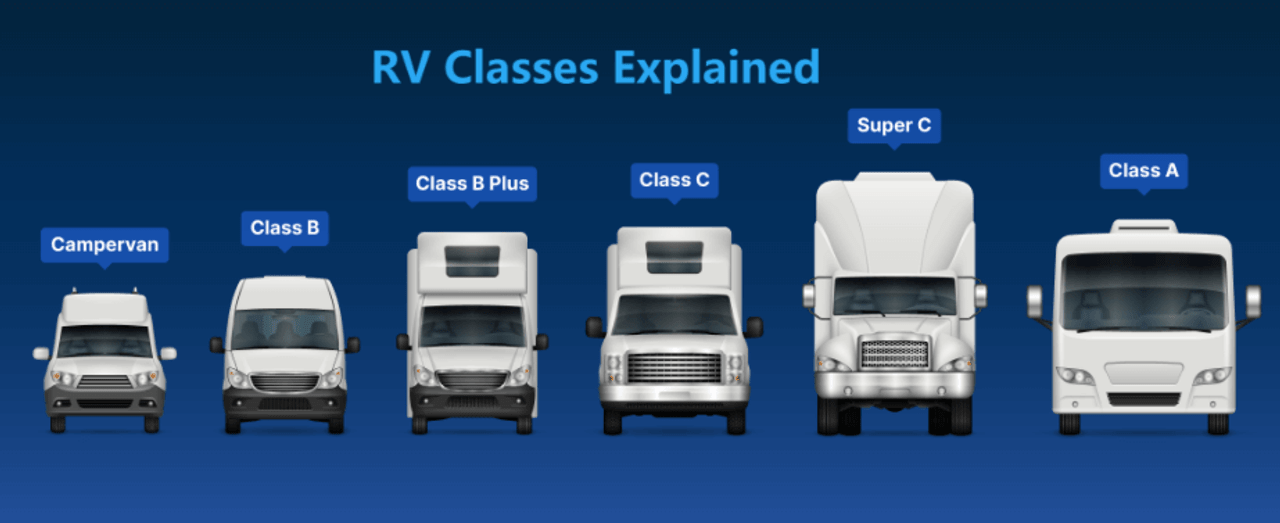RV Classes: A Complete Guide for RV Beginners 2024
Do you know there are various RV classes or forms of motorhomes? There are smaller, medium-sized, basic tow trailers, and full-size trailers. RVs allow you to explore the various parts of the country while enjoying simple life luxuries such as bed, living space, bathroom, and kitchen. What is the right RV for your adventures? Let us guide you in understanding various types of RVs, and their advantages and drawbacks. Let’s dive in!
RV Classes Explained
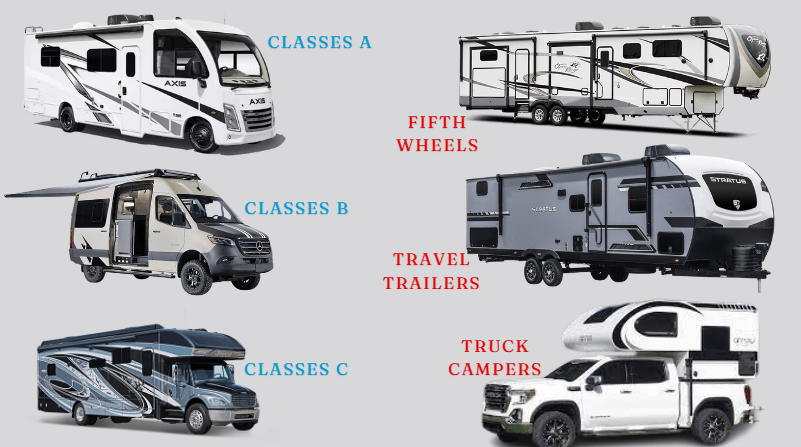
There are different classes of RVs. The classes vary depending on the size, shape, and weight. The six commonly known RV classes are:
Class A Motorhomes- Class A RVs are fully equipped, luxurious, and spacious. They are ideal for individuals, families, or groups for long-term adventures or travels.
Class B RV- The B Class motorhomes are compact-sized, easy to drive, and fuel efficient. Due to their smaller size, they are ideal for couples and individual adventurers. They can accommodate essential features and amenities.
Class C RV- They are mid-sized motorhomes, suitable for families, and friend groups. It has enough sleeping spaces and comfortable living spaces. Class C’s are four-wheel drive and are easy to drive.
Fifth Wheels- Fifth wheel RVs are stable, spacious, and offer a luxurious experience to the users. However, it needs a truck for towing it.
Travel Trailers- The travel trailers are suitable for travelers who already own a capable vehicle that can tow. The towable travel trailers have various layouts and sizes.
Truck Campers- They are suitable for travelers who need a compact yet versatile camper with off-road capabilities. It is usually mounted on a pick-up truck.
Understanding Motorhome RV Classes for Beginners
Motorhomes are self-powered RVs that have their own engine and driving chassis.There are three classes of motorhomes, which are Class A, B, and C which are classified according to the chassis they are built on. Let’s explore various motorhome Classes plus the pros and cons of each class.
1. Class A RV
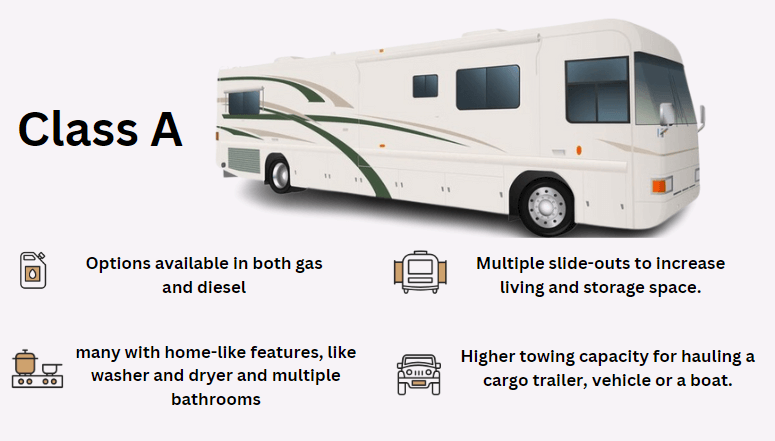
Class A motorhomes are the largest category of drivable RVs. They look like a bus with sizes ranging from 24 to 45 feet and weigh up to 30,000 pounds. They have a single chassis, usually with more than two axles. However, heavier class A motorhomes can have up to three axles.
The Class A RVs have a wide range of possibilities for the interiors. It is capable of accommodating luxuries similar to that of an average house.
Some of the items in Class A motorhomes include a king-sized bed, washer, dryer, two baths, a large living area with sofas, recliners, a dining table, fireplace, and television. Also, the kitchen is fully equipped with features such as oven, freezer, fridge, stovetop, microwave, and dishwasher.
The Class A RVs feature a large cargo capacity located above the chassis and underneath the camper space. The storage space can hold things like bicycles, sports equipment, lawn chairs, and so much more.
Pros
- Accommodates a wide range of basic and luxurious living amenities.
- It is very spacious and luxurious.
- It features a large storage space.
- It does not need a towing vehicle. However, it can tow another vehicle.
Cons
- The costs of purchasing a Class A motorhome are high.
- The costs of insuring, maintaining, and repairing Class A RVs are high.
- It is not fuel-efficient
- The driver may require special training and a special driving license.
- It may require specialized and designated parking for motorhomes, which may cause the user to incur additional high costs.
2. Bus Conversion (Skoolie Bus)
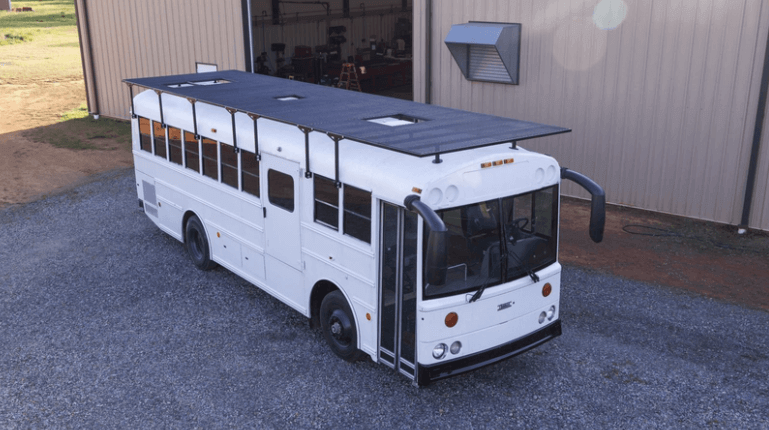
Just like the Class A motorhomes, bus conversion is simply built on a school bus body. Most of the bus conversions are DIY projects. However, there are professional companies that specialize in customizing the bus conversions. Bus conversions are approximately 20 to 45 feet and weigh around 15,000 to 35,000 lbs. It features basic amenities such as beds, kitchen, bathrooms, and living space.
Pros
- The initial investment cost of bus conversion is low compared to other types of RVs.
- School buses are made with high-quality materials thus they are highly durable.
- Skoolies or bus conversions are unique and you can be creative customizing it.
Cons
- The renovation and customization costs are relatively high.
- Due to their length, they are not easy to park, especially for new bus drivers.
- Most bus conversions, especially school buses, are not fuel-efficient.
3. Class B RV
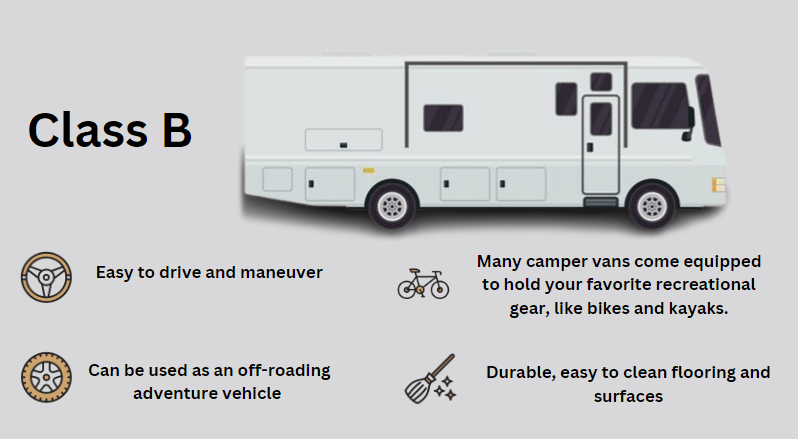
The Class B RVs are among the smallest classes of motorhomes. They are usually known as campervans. They weigh approximately 6,000 to 8,000 pounds with a length of an average van. Due to their smaller size, they are capable of navigating remote terrains where other types of vans cannot reach.
Although agile, these campervans have limited interior spaces compared to larger motorhomes. Some of the features of a Class B RV include a small kitchen with a sink, minimal counter space, and a small cooktop.
Most of the Class B RVs have marine-style bathrooms combining features such as a toilet, shower, and sink in one room. Other features of the Class B RV are a sleeping area for two people and a storage area.
Class B RVs are suitable for adventurers on a budget and who want to explore more remote areas. It is ideal for singles, couples, or a small family.
Pros
- They are more fun as you can explore remote areas.
- Low costs of maintenance and repairs.
- They are economical in terms of fuel consumption.
- Does not require specialized training or a driver's license.
Cons
- Very limited storage and living spaces.
- Can only accommodate a limited number of people two adults and up to two children.
- Cannot accommodate larger appliances such as dishwashers, fridges, or laundry machines.
4. Class B+ RVs
The Class B+ RV lies somewhere between Class B and Class C. It has a relatively larger space than the B class. Typically, a class B+ RVs have the features of a van but it has a truck chassis.
Also, it features a wider and taller body than an ordinary van. It features slide-outs for more added storage and space.
It is agile like the Class B RV, capable of going to remote areas where other larger motorhomes cannot access. Additionally, Class B+ RVs are all-wheel drive allowing users more adventures in remote areas. It is a bit more spacious allowing up to four adults and smaller children.
Pros
- Easy to drive and convenient to park.
- Features an ample living, kitchen, and sleeping spaces.
- The bathroom facilities are separate and convenient.
- It is a all four-wheel drive for off-road experiences.
- It can accommodate various small-sized home appliances.
Cons
- Class B+ RVs are pricier than ordinary B class and some Class C RVs.
5. Class C RV
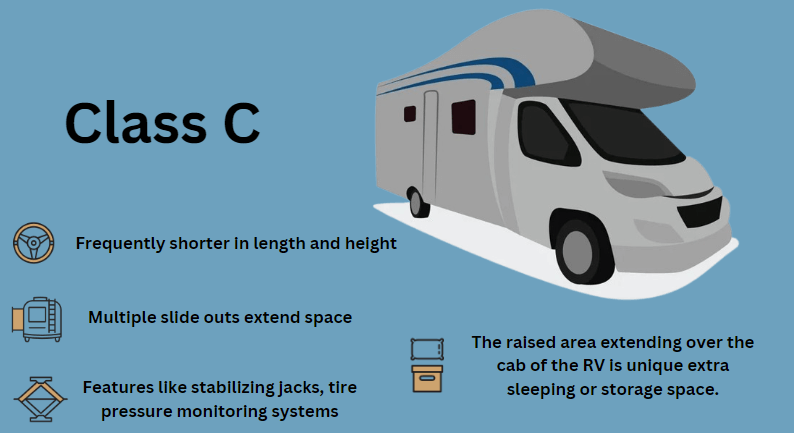
Class C RVs combine the best Class A and B features. They are significantly lighter and more compact than Class A but larger and feature more amenities than Class B. The size ranges between 20 to 28 feet and weighs around 10,000 and 13,000 pounds with a height of 10 feet. They are either constructed on a truck or van chassis.
The Class C RVs feature a private bedroom at the back of the RV. The over-cab space of the RV features a sleeping area for two and sofas, which can be folded into additional beds. It can accommodate up to eight people. You can expand the living space by pulling out the slide-outs.
The toilets and showers are separate making it more comfortable for more users. Other notable features include kitchen appliances such as dishwashers, a washing machine, a dining table, a television shelf, and an exterior door leading to the living space.
Pros
- It is reasonably affordable compared to Class A motorhomes.
- It has spacious sleeping and living areas.
- Features larger storage spaces compared to class B RVs.
- Has better fuel consumption efficiency.
- Equipped with basic amenities and comfort.
- Easy to maneuver than Class A RVs.
Cons
- The costs of repair, maintenance, and fuel for C-class RVs are high.
- It is fairly challenging to drive a C Class due to their relatively large body.
- Pricier than Class B motorhomes.
6. Super C Class RV
A Super C motorhome is an upgraded and heavy-duty Class C RV. Super C RVs are constructed on a heavy-duty truck chassis. Also, they are equipped with a strong diesel engine, which makes them ideal for withstanding heavy loads. The size of a Super C ranges from 33 and 45 feet.
The highlight of Super C motorhomes is the top bunk area over the cockpit used for sleeping or storage. It can accommodate up to seven people and it is perfect for traveling long distances.
Pros
- Adequate storage capacity below the floor.
- There are several slide-outs for increased space.
- Easy to drive and does not require specialized training or a license.
- They have high horsepower and remarkable torque, with a towing capacity ranging between 10,000 to 20,000 lbs.
Cons
- Super C Class are pricier than standard C class.
- Due to their large size, it is a bit hard to maneuver and park.
- Relatively high fuel consumption due to their high power needs and towing capacity.
Towable RV Classes
All towable RV Classes need a strong and capable tow vehicle. To tow efficiently, your towing vehicle or truck must be over a half-ton. The following are the common towable RV classes.
1. Pop-up Trailers
Pop-up trailers are the smallest type of RV. They do not have an engine. They are usually lightweight and easy to set up.
Pros
- They are cost-friendly and among the most affordable RVs.
- Pop-ups are lightweight and easy to tow.
- Easy storage. You can conveniently store it in your garage.
- They are safe to tow due to their compact size and lightweight nature.
Cons
- They are small in size. The user is limited to storage and living space.
2. Travel trailers
There are different types and sizes of travel trailers. Travel trailers are easy to set up. However, bigger travel trailers require a bigger and stronger tow vehicle. Most travel trailers are approximately 10 to 35 feet long.
Pros
- Travel trailers are more affordable than motorized RVs.
- Practical and easy to manage especially for people who don’t travel often.
- The cost of insuring and maintaining a travel trailer is minimal compared to a motorhome.
- Travel trailers depreciate slower than RVs.
- When not in use, you can rent out the trailer.
Cons
- Setting up campgrounds is hard and time-consuming.
- It is not the safest option on the road due to swaying.
3. Fifth Wheels
Fifth Wheel towable trailers are the largest Class of non-motorized RVs. They are also heavy and require a special hitch to mount it on the truck bed. Due to its heavy nature, you need an over one-ton truck to tow it safely.
Also, fifth wheels are more durable than other types of trailers. They offer a bigger living, sleeping, kitchen, and storage space making them ideal for full-time living. They are pricier compared to other types of towable trailers.
Pros
- They are safer to tow compared to travel trailers. The weight of the fifth wheel rests on the truck bed.
- More space and storage. Due to their massive size, fifth wheels have more space for beds, living, storage, and other essential amenities.
- Minimal maintenance costs than operating a motorhome.
Cons
- You must have a strong vehicle capable of safely towing the fifth-wheel.
- You cannot access the travel trailer while on the go.
- Requires a large storage space, which might cost a lot of money when not in use.
4. Truck Camper
Truck Campers are small-sized RVs usually mounted at the back of a pick-up truck. Most of the camper trucks have basic amenities such as a bed, kitchen, and bathroom. They can accommodate up to two people. You can remove the camper from the truck to suit your needs.
Pros
- They are versatile unlike the tow trailers.
- They are the most simplistic RVs with minimal maintenance requirements.
- Easy drivability due to the compact size and lightweight nature of the camper.
- Low depreciating value unlike other types of RVs and motorhomes.
- Easy to maneuver compared to trailers and fifth wheels.
Cons
- The space is limited for camper trucks. Can only fit two people.
- Not friendly to disabled people.
- It is hard and time-consuming to mount and detach the camper on the truck.
5. Hybrid Trailer
Hybrid RV trailers resemble a traditional fifth wheeler. It is a hybrid between a travel trailer and a pop-up camper. All the sides of a hybrid trailer are hard, except one side to allow pop-outs. The pop-outs have foldable beds. It allows the campers more space without exerting too much weight on the van. Hybrid trailers are suitable for traveling during warm weather.
Pros
- It is suitable for off-roads.
- You can access basic amenities such as solar power, water, beds, a kitchen, and a bathroom.
- Hard walls and heavy-duty canvas protect you against harsh weather.
- They are compact-sized and lightweight.
- They are more fuel-efficient compared to other RVs.
- Relatively easy and fast to set up
Cons
- Hybrid trailers are a bit pricey.
- Limited storage space.
6. Toy Haulers
Toy haulers are large travel trailers featuring a living space, bed, kitchen, and bathroom. The highlight of a toy hauler is that it allows you to bring a large toy such as a snowmobile, ATV, or bike. The toy haulers feature a door and a ramp at the back which is used for toy storage.
Pros
- They are extremely versatile as you can use it for storage, living, and camping
- Large storage convenient for carrying heavier toys allowing you to have more adventures.
- High resale value. They attract more value than other types of campers due to their versatility.
Cons
- They are a bit expensive in terms of purchasing, fueling, and maintenance.
- Not luxurious like other types of campers such as Fifth wheels.
7. A-Frame Trailer
Unlike the Pop-up camper, the A-frame trailer features foldable hard walls that are flat and compact for easy towing. When fully set up, they form an A shape. The pop-up roof provides additional space for sleeping. Although they are compact-sized, they take time to set up and tear down.
Pros
- Affordable than other types of RVs and trailers.
- Easy portability due to their foldable and compact nature.
- They are versatile and can be used for camping, outdoor activities, and tailgating.
- They are comfortable and convenient.
Cons
- It is challenging and time-consuming to set up and dismount it.
- They are not adequately insulated and can be uncomfortable during extreme hot or cold weather.
- It has limited storage space and amenities.
Comparison of the Various RV Classes
There are tons of RV classes and models in the market, which makes it daunting to find a perfect one. The following table will break down the outstanding features of the various RV classes.
|
RV Class |
Class A Motorhome |
Class B |
Class C |
Travel Trailers |
Fifth Wheels |
Truck Campers |
|
Features |
Massive luxury bus RVs |
Smaller-sized van-like RVs |
Van-like but mid-sized RVs with cab-over |
Non-motorized towable RVs |
Towable RVs with an elevated front |
RVs placed on the truck bed |
|
Capacity |
4 to 8 people |
2 to 4 people |
4 to 8 people |
2 to 8 people |
4 to 8 people |
2 to 4 people |
|
Length |
25 to 45 feet |
16 to 24 feet |
20 to 32 feet |
12 to 35 feet |
25 to 40 feet |
8 to 11 feet |
|
Towing Capacity |
Capable of towing a vehicle |
Does not tow |
It’s capable of towing |
It requires a vehicle to tow it |
Depends on a towing vehicle |
It’s size is limited to the capacity of the truck |
|
Ease of Driving |
Requires specialized driving skills |
Easy to drive |
Requires skills in driving a truck |
Requires skills of towing using a large SUV or truck |
Requires skills in towing with a pick-up truck |
Easy to drive a truck with a bed |
|
Facilities or Amenities |
Full-featured luxury amenities |
Basic comfortable features |
Moderate but depends on the model |
Varies with the model |
Luxurious |
Varies with the model Basic or moderate |
|
Set-up time |
Entails driving and parking only |
Entails driving and parking only |
Driving and parking |
Requires leveling and detaching from tow vehicle |
Must be leveled and removed from the tow vehicle |
Requires placing on the truck bed |
|
Estimated costs |
$60,000 to over $500,000 |
$50,000 to over $150,000 |
$50,000 to over $150,000 |
$10,000 to over $50,000 |
$20,000 to over $100,000 |
$8,000 to over $40,000 |
|
Storage Capacity |
Massive storage |
Limited storage |
Adequate storage |
Depends on the size of the tow vehicle |
Enough storage |
Limited storage |
|
Ease of Parking |
Difficult to its large size |
Easy to park |
Fairly easy |
Depends on the size of the tow vehicle and parking site |
Hard to park due to its large size |
Easy to park |
|
Mileage |
6 to 10 MPG |
15 to 20 MPG |
8 to 13 MPG |
10 to 20 MPG |
10 to 18 MPG |
Depends on the truck |
Considerations When Choosing a RV Or a Trailer
There are several things you must consider when choosing the right RV or travel trailer for your adventures. The following are some of the key things to consider when choosing a perfect trailer or RV for your next adventure.
1. Your Budget
Recreational vehicles cost arm and length. Therefore, you will spend thousands or millions of dollars purchasing or leasing a recreational vehicle. Before you choose an RV, set aside a budget. Having a budget will restrict you from overspending.
2. Special Driver’s License
Some larger-sized RVs require specialized training and driving licenses. For instance, larger motorhomes such as heavy trailers, class A, and Class C will need specialized driver’s licenses.
3. Cost of Maintenance and Fueling
Most RVs have a reputation for high demand for fuel and high maintenance fees. However, some RVs have higher maintenance and fuel costs than others. Therefore, do your research before settling for any RV.
Remember, different RV classes have varying maintenance and costs of fuel. Additionally, the size and the shape of the trailer will have a varying amount of drag, thus affecting the fuel efficiency.
4. Registration and Licensing of RVs and Trailers
In some states, you must register and obtain a license to operate a recreational vehicle. Before purchasing the RV, check if there are any registration and licensing requirements in your state.
Key aspects that influence the type of license you will obtain for your RV include the age of the vehicle, length, weight, location of the engine, and the type of chassis. Check the respective regulations of the state before choosing the RV.
5. RV’s Storage Capacity
When choosing the RV, consider your storage needs. The bigger the motorhome, the larger the storage space. Smaller RVs have limited storage spaces.
When choosing a recreational vehicle, consider the RV length, floor plan, and height. Consider if you will travel with children and pets. The larger the family, the more need for storage space.
6. RV Storage or Parking Expenses
Where will you park the RV when it’s not in use? The bigger the recreational vehicle, the higher the storage costs. If you have enough space on your property, you can put up a storage shed for your RV or travel trailer. That way you can cut off storage costs. However, consider this before choosing an RV.
7. Towing Capacity
If you opt for a towable travel trailer, can your vehicle withstand the towing weight? Before you choose the RV trailer, ensure your car can support the weight of the trailer. Overloading will damage your vehicle.
Should You Buy an RV Or A Travel Trailer?
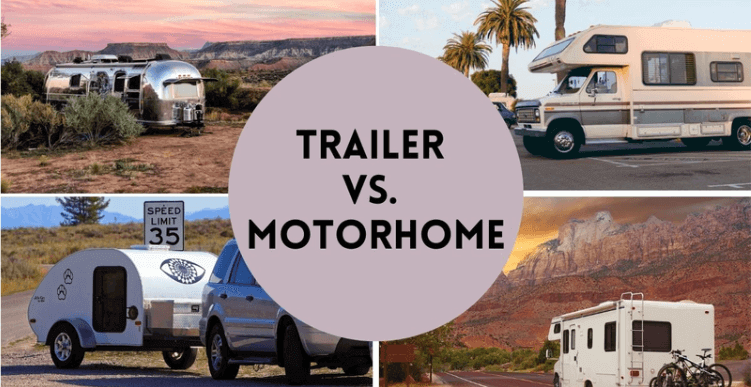
What’s the difference between a travel trailer and an RV? An RV or motorhome is driven with all its components and features, while the travel trailer is towed by another vehicle.
Motorhomes and travel trailers vary in sizes and features depending on your budget and customization requirements.
Which one should you buy? Here are crucial factors to consider in deciding whether to buy a travel trailer or a motorhome RV.
1. The Purchase Costs
The price margin between a travel trailer and a motorhome is big. The minimum cost of purchasing a motorhome is approximately $50,000 and runs up to millions of dollars.
Trailers are much more affordable, with prices ranging between $20,000 to $30,000. Therefore, your budget will guide you in deciding whether to choose a travel trailer or an RV.
2. Costs of Insurance
The costs of insuring a travel trailer are significantly lower compared to that of a motorhome or RV. Consult various insurers for customized insurance deals.
3. The Frequency of Usage
How frequently do you intend to use the RV or the travel trailer? This is a key factor to consider when deciding to buy an RV or a trailer.
If you travel often and for long distances, an RV is a good choice. However, if you intend to travel just a few times a year, a travel trailer is a better option.
4. Costs of Maintenance
Both the RV and travel trailer will require regular maintenance. Note that the costs of maintenance for the RV are higher compared to the costs of trailer maintenance.
You are likely going to spend thousands of dollars per year on the maintenance costs of a motorhome. The maintenance costs for the trailer are almost half of the RV.
5. Drivability and Comfort
RVs and motorhomes give you the luxury on-the-go experience. In most states, it is against the law to tow the travel trailer with people onboard.
If you are looking for ultimate luxury for your adventures, then a motorized RV is ideal. Also, some people are afraid of towing a trailer in the back due to swaying.
Conclusion
It’s a wrap for this detailed RV Classes guide. As you have read, there are several classes of RVs as well as towable trailers.
What do you prefer? If you are interested in buying or renting an RV, you can explore the various types discussed above. Consider crucial factors such as your budget, number of people to use the RV, frequency of travels, and travel distance.
Also, you take some of your top choices for a test drive to help you settle for the right one.
Frequently Asked Questions
1. Do you require a specialized driver’s license for driving a motorhome?
Most smaller-sized RVs do not require a special driver’s license. However, larger RVs such as Class A, and travel trailers require the driver to have a special driving license. Check your State’s regulation regarding the RV driver licensing.
2. How can I tell if my vehicle is capable of towing a travel trailer?
First, understand your vehicle’s tow weight limit. Additionally, check the trailer’s GVWR (Gross Vehicle Weight Rating) to help you determine the amount of load your vehicle can tow.
3. Is a Class A motorhome hard to drive?
Although challenging, driving a Class A motorhome is fairly manageable. However, you need special training and you should obtain a special driver’s license. Additionally, modern Class A RVs are equipped with cameras for easy navigation and visibility.

